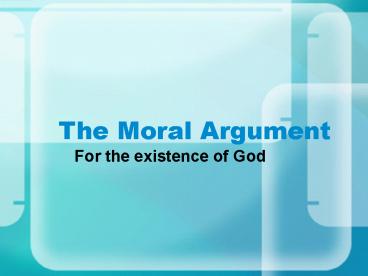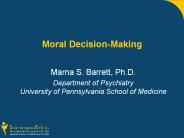The Moral Argument - PowerPoint PPT Presentation
1 / 25
Title:
The Moral Argument
Description:
As humans do we have a moral conscience or a feeling of obligation? ... Emotivism When a person states that an act is wrong they are only expressing ... – PowerPoint PPT presentation
Number of Views:60
Avg rating:3.0/5.0
Title: The Moral Argument
1
The Moral Argument
- For the existence of God
2
As humans do we have a moral conscience or a
feeling of obligation?
- A child falls into a deep lake.
- No one else is around.
- Should you jump in and try to save her?
- You cant swim.
3
- The Moral Argument for the existence of God
suggests that God is the best solution to the
question as to why we feel that we should behave
morally.
4
- Or put another way, if there were no God to
judge, award places in heaven or punish then why
would anyone act against their own self interest?
5
Break down of the argument
- Proposing
- Aquinas
- Kant
- Newman
- Owen
- Trethowan
- Opposing
- Freud
- Fletcher
- Dawkins
6
Aquinas
- NB Aquinas did not mention the term moral
argument, but what he says seems to fit well. - In his fourth way Aquinas argues that as humans
we all experience things that are true, noble,
good and valuable. - These things must take their reality from things
that are true, noble, good and valuable. - Infinite regression is not possible and so there
must be something which is the most true, noble,
good and valuable. - This is what we
call God.
7
John Newman
- The reason we have a conscience is because God
has given us this mechanism so that we know how
to do good. - If, as is the case, we feel responsibility, are
ashamed, are frightened, at transgressing the
voice of conscience, this implies that there is
One to whom we are responsible, before whom we
are ashamed, whose claim upon us we fear. - Grammar of Assent (1870)
8
BUT many would disagree with this idea that there
are binding moral laws that can only be explained
by the existence of God
- Cultural relativism Right and wrong differs from
one culture to another - Emotivism When a person states that an act is
wrong they are only expressing their own emotion
or attitude - Evolution Humans who are kind are more likely to
survive. This characteristic is passed on
genetically.
9
Immanuel Kant God is required for morality to
achieve its end
- Gods existence cannot be proved but is implied
by our experience of morality - Our experiences show that people feel obliged to
act in virtuous and good manner - True virtue should be rewarded by happiness
- Kant talks of the summum bonum (highest good)
- Ought implies can it must be possible to
achieve the summum bonum if we are to feel
obliged to reach it - While humans can achieve virtue, they have no
power to ensure that virtue coincides with
happiness - Thus there is a need to postulate the existence
of God as a way of bringing virtue and happiness
together - This proportioning does not take place before
death so there must be life after death
Much of this should be familiar from ethics
10
Criticisms of Kants Moral Argument
- According to Kant, ought implies can. If Kant
means that it is possible to bring about the
summum bonum logically then just because it is
not a logical contradiction to accept this does
not mean that it factually happens. If Kant meant
that it does factually happen then we may ask
why?.
11
- Why assume that only God can bring about the
highest good? - Brian Davies An Introduction to the Philosophy
of Religion asks Why not a pantheon of angels?
(1982, p96)
12
- Why assume that virtue must be rewarded with
happiness? - Sense of duty may be explained without reference
to God. We may be socialised into a sense of
duty
13
Is there an unconditional and objective moral law?
Why do we need to attain the summum bonum?
14
Freuds critique of Kants Moral Argument
- Our sense of moral duty is caused by the
psychological conflict between our most basic
desires and the controlling influences of society
and our parents - The subconscious part of the mind is called the
super ego
15
- Freud said that our subconscious desires (such as
sex and aggression) are very powerful and can be
dangerous - If unchecked, such behaviour would be ultimately
self-destructive as it is incompatible with
survival within society
16
- According to Freud, the role of the ego or
conscious part of the mind is to control our
desires within the limits placed on us by
society. - Restraining our desires causes tension, however,
resulting in the creation of the super-ego.
17
- Rather than directing our aggression outwards
towards others, the super-ego internalises it,
reflecting it back upon ourselves - This is the voice of conscience which restricts
our behaviour and banishes our innermost desires - It is also the source of guilt as our super-ego
punishes us when our desires become too strong
18
- So Freud argued that what Kant thought of as an
objective moral law is really generated by our
minds as a result of the conflict between our
deepest desires and society
19
- Freud also argued that our consciences are
created by the rules of our parents. - Parents are the first people to limit a childs
behaviour. - The standards and ideals of the parents are
internalised by the super-ego. - This undermines Kants idea of an objective
moral law as the demands of our conscience are
relative to the expectations of our parents.
20
Freud and the Oedipus Complex
- The conscience is linked with the parents
relationship with the child and so will be
influenced by the sexual trauma of the Oedipus
complex. - When a boy desires his mother sexually, the
super-ego internalises the perceived anger of
the father and the frustrated desires of the
child. - For Freud, this explains why feelings of guilt
are so strongly felt with sexual desire.
21
Evaluation of Freud
- Agree there is no objective moral law -
even those who claim that there is can sometimes
allow exceptions. - Kant says that the categorical imperative allows
for no exceptions to the rules (e.g never lie). - But others (e.g.WD Ross) allow some points to
take precedence (such as the need to protect
life) - So there are exceptions to rules???
22
- Cultural relativists argue that the
differences between groups and cultures show that
there is no objective moral law morality is
based on the expectations of a society. In a
different context different rules will be
enforced.
23
Freuds view of conscience can be criticised
- There are more likely explanations than the idea
of an ego and super ego. - For example, Erikson and Fromm suggest our moral
awareness is based on a recognition that certain
things should be protected because they are of
value to us. Stealing may be classed as evil
because we value our possessions. This shows that
moral obligation may be formed by us on our own
it is not just the result of other peoples
expectations we have to apply our own reason.
24
Brian Davies criticises Kant
- Kant says ought implies can it is not logical
to aim for something out of our reach. - Davies disagrees. We might aim for something even
though achieving it is unlikely
I am going to aim for an A grade a AS philosophy
25
Brian Davies also
- Even if the Summum Bonum implies the existence of
God it does not prove it. - Why cannot a top-ranking angel do the
job?....why not a pantheon of very clever,
Kantian-minded angels?































